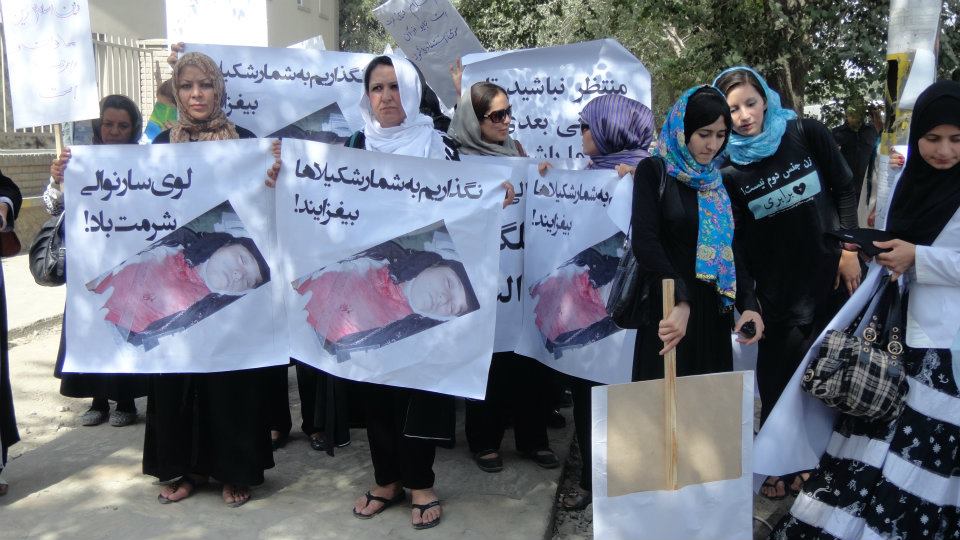On July 31, dozens of academics and women's rights activists took to the streets of Kabul to protest the delay in government investigation into the case of Shakila, a 16-year-old girl who had been reportedly raped and murdered [fa] last year in Afghanistan's Bamyan Province.
The alleged crime took place in the house of Wahidi Beheshti, a member of the provincial council, some six months ago. Beheshti and his powerful supporters maintain that Shakila took her own life. Yet, many people accuse the politician of murdering the girl and suggest that he is now using his power and connections to delay or mislead the investigation.
For instance, Rahim Ghaffori, an Afghan civil society member, has said [fa]:
به جان شکیلا تجاوز صورت گرفته و فیری هم که شده از پشت سر بوده، دوسیه وی از طرف طب عدلی به سارنوالی فرستاده شده ، متاسفانه سارنوالی یکی از دوستان اقای واحدی بهشتی است که در این قسمت توجه نکرده.

Afghan women marching in Kabul and calling attention to the case of Shakila. Image by Ferdous Samim, used with permission.
The protesters in Kabul marched past the office of the Afghan independent human rights commission (AIHRC) towards the country's parliament. They held Shakila's photos and chanted, “Shame on Bamyan attorney. Shakila did not commit suicide.” The protesters also shouted, “Ministry of Justice! Justice! Justice!” and “Human rights! Seriousness! Seriousness!”.
(Video from the event by RFE/RL Radio Free Afghanistan can be watched here. More photos from the protest can be accessed here).
Following the event, Young Women for Change, an Afghan non-governmental organization that co-organized the protest, posted on its Facebook page:
The main slogan for today's walk was “let's not allow for more Shakilas to get murdered,” which points [out to the fact] that this walk was not only to demand justice for Shakila, but to point out all the injustices towards all women in the light of her case.
Zohal, one of the protesters, suggested [fa]
.قاتل شکیلا آزادانه گشت و گذار می کند و دولت هیچ اقدامی برای دستگیری اش نمی کند و پارلمان ازمتهمین پشتیبانی می کند. ما ازدولت میخواهیم که جداً موضوع را پیگیری کرده و عاملین تجاوز و قتل شکیلا را دستگیرو محاکمه کند
Not an isolated event
The protest in Kabul was not an isolated event. On July 25, dozens of people took to the streets of Bamyan to call attention to Shakila's case.
Besides, many activists and netizens have used social media to demand justice and make sure that Shakila's murderer does not go unpunished. The case is closely followed by Afghan Facebook users who have set up the page “Shakila” and two open groups, “Our Shakila” and “Group of Martyr Shakila's Supporters“.
Asad Buda, an Afghan writer, wrote [fa]:
تنها کسی زبانِ شکیلا را میفهمد که با زبانِ تاریخ آشناست: شکیلا بیان و یاد کسانی است که کشندگانِ آنان هرگز مجرم شناخته نمیشوند.
Ali Amiri added [fa]:
یک تفاوت اساسی میان مرگ شکیلا و صدها همانند او که پیش از این طعمه غارت و تارج و تجاوز شدند وجود دارد. مرگ او را همه فریاد کردند. خون سرخش را همه دیدند… اینک در رگ هر رسانه خود او رسیده و جاری شده است. هر شاعری اورا فریاد می کند. اینک این حجله سرخ شکیلا است که خواب سیاه همه را به کابوس بدل کرده است.






